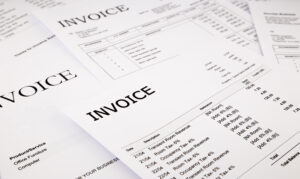Cash flow problems are one of the biggest threats to small businesses, so when a client or customer disputes an invoice and refuses to pay, this can cause a huge amount of stress.
At some point, all businesses will have to deal with invoice errors and disputes. It can be easy to get defensive in these situations, but remember that you want to retain positive relationships with your customers while getting the money you’re owed, so you need to deal with these issues tactfully.
In this helpful guide, you’ll learn all about your invoicing obligations as a business owner and how to deal with various types of invoice disputes. Ultimately, you’ll discover how to minimise your losses from disputed invoices and retain customers even after a disagreement.
What Is a Disputed Invoice?
If a customer disputes an invoice, this means that they disagree with one or more details on the invoice and refuse to pay until these issues have been resolved. For example, they could disagree with the total payment amount or claim that the services or products they purchased have not been delivered to the agreed standards.
These disputes could result from an error made by your business, a false claim from the customer, a genuine misunderstanding or simply a mistake printed on the invoice. In the last case, the issue is easy to resolve, but when there are more complex disputes or misunderstandings, the resolution process could become very complicated.
Invoice Dispute Laws in the UK
In the UK, there are no strict legal requirements surrounding invoice disputes. Generally, a customer should make their dispute clear within 30 days of receiving the invoice, and what happens after this will usually be dictated by the terms and conditions in any written contracts you have with your customer.
If you’re not sure whether you have a specific written contract with your customer relating to their purchase, then you should look at purchase orders and other legal documents between you and your customer to see if there are terms and conditions attached. These terms and conditions may set out payment terms and guide you on how to resolve invoice disputes.
If you can’t find a formal contract with terms and conditions, then you may find it a bit harder to quickly reach a resolution. However, by following the steps outlined below, you can resolve the invoice dispute amicably and recover as much money as possible.
Common Reasons for Invoice Disputes
But first, before we look at how to resolve an invoice dispute, we need to understand the most common reasons why customers may disagree with an invoice. This will help you find an appropriate response for each situation.
Invoice Error
The easiest dispute to deal with is a simple invoice error. If you’ve made a mistake on the invoice by writing the wrong payment amount or writing the wrong customer details, then your customer should be able to quickly notify you of the error. Then, you can simply make some corrections and send an amended invoice.
Unsatisfactory Work
If your customer isn’t satisfied with the quality of work you provided, they may refuse to pay the invoice until you re-do the work. In this situation, you’ll find it much easier to come to a resolution with your customer if your contract outlines the exact requirements for the work, as this can clear up any misunderstandings and prevent your customer from changing their demands after the fact.
Faulty Products
Another common reason for disputed invoices is the receipt of faulty or damaged items. To resolve this issue, you’ll need to obtain proof of whether the products arrived damaged to determine if you’re obliged to send the order again. Otherwise, if the products were in good condition when they were received and have since been damaged by the customer, you’ll need to find a way to get your payment.
Late Delivery
If the products your customer ordered are delivered late, then they may refuse to pay the full amount on the invoice. Again, having a written contract with payment terms and conditions will allow you to outline what will happen to the payment in certain situations (e.g., late delivery penalties to be applied within a particular time frame).
Price Disagreement
Sometimes, invoice disputes can arise when you and your customer disagree on what costs they have agreed to pay. Your customer may claim that they weren’t made aware of certain charges listed on the invoice and therefore refuse to pay them.
If you haven’t had clear discussions with your customer about what they will be charged, then you’re opening yourself up to these sorts of claims. Even better, you should have a written contract with your customer detailing all of these points.
Inability to Pay
Finally, your customer may be unable to pay the invoice due to financial difficulties. This issue may be more difficult to resolve, but you could agree on a longer-term payment plan with instalments as a compromise. This will help you maintain a positive relationship with your customer whilst also ensuring that you receive the money you’re owed.
How Should You Respond to an Invoice Dispute?
Often, your response to an invoice dispute will depend on the circumstances of the dispute, but there are also some general steps you should follow. If the dispute can’t be resolved easily (e.g., by sending a new invoice to correct a typographical error), then here’s what you should do.
Double-Check the Invoice
Before you send an invoice, you should always double-check it to ensure that every detail is correct. This will minimise the chances that an invoice dispute will arise.
If your customer does raise a dispute after receiving the invoice, then your first task is to look at the invoice again to identify the problem they’ve highlighted. Once you understand the issue, it’ll be much easier to reach a solution. For example, you could send a new invoice and issue a credit note.
Ask Customer to Explain
Sometimes, it may not be easy to identify what exactly went wrong, especially if your customer has complaints about certain requirements not being met or not being told about particular charges. Instead of becoming defensive and damaging your relationship with your customer, you should ask them to explain their dispute in detail and submit this in writing (e.g., in an email). Keep asking questions until you discover exactly what went wrong – you’ll then find it easier to resolve the issue.
Look at the Contract
As explained earlier, you’ll be able to resolve invoice disputes much more quickly if you have a written contract you can reference. In this case, you can look at the contract again when a dispute arises so that you can discover if you’ve made a mistake.
If you believe that your customer has made a mistake, you should ask them to read through the contract again rather than becoming confrontational. This may help them realise their mistake and agree to pay the invoice.
Rectify Mistakes
After looking at the contract again, you may discover that you’re in the wrong. For example, you could see that you haven’t fulfilled your customer’s expectations laid out in the contract. To resolve this, you should re-do the work or send new products to maintain your relationship with your customer. This will allow you to continue doing business with them in the future.
Compromise
On the other hand, your customer may be at fault or there may have been a genuine misunderstanding. If you’re struggling to reach a resolution, you may have to compromise in order to get your money whilst still maintaining the relationship. For instance, you may agree to resend some products as a gesture of goodwill, or you may agree to extend the payment deadline if your customer is having cash flow problems.
Escalate
Unfortunately, you may have to escalate this matter if you’ve exhausted all other options and you have evidence that the customer is in the wrong. Taking legal action could be the most effective way to get your money, but it’ll also damage your relationship with your customer, so you should only choose this as a last resort.
Additionally, simply warning your customer that you’ll be taking legal action could be enough to prompt them to pay you if the dispute has been going on for a while. If legal action can be avoided, this will be the best outcome for both parties.
Conclusion: Dealing with Disputes Effectively
Disputed invoices are a common problem for all types of businesses. Luckily, many of these issues can be avoided by thoroughly checking all invoices and always writing formal contracts. However, you may also deal with more difficult disputes that require a lot of communication and patience.
Above all, you should remember to stay calm and professional when dealing with invoice disputes. It can be incredibly frustrating when a customer won’t pay the full amount, but becoming confrontational will only push these customers away and give you greater cash flow problems down the line.
Read more:
How Should Small Businesses Deal With Disputed Invoices?
















